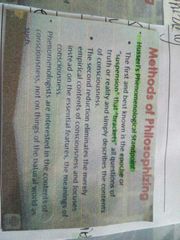![]()
![]()
![]()
Use LEFT and RIGHT arrow keys to navigate between flashcards;
Use UP and DOWN arrow keys to flip the card;
H to show hint;
A reads text to speech;
29 Cards in this Set
- Front
- Back
|
Philosophizing |
To think or express oneself in philosophical manner |
|
|
Phenomenology Existentialism Postmodernism Analytic tradition Logic and critical thinking Fallacy |
Methods of philosophizing |
|
|
Edmund Husserl |
Who founded phenomenology? |
|
|
Phenomenology |
Method for finding and guaranteeing that focuses on careful inspection and description of phenomena or appearances |
|
|
Phainómenon meaning appearance |
Phenomenology comes from the greek word |
|
|
Husserl's phenomenology |
This phenomenology is the thesis that consciousness is intentional |
|
|
Phenomenologist |
Theu can desribe the content of consciousness and and acoordingly, the object of consciousness without any particular commitment |
|

|
Read |
|
|
Existentialism |
Not a primarily a philosophocal method nor is it exactly a set of doctrines but more of an outlook or attitude supported by diverse doctrines centered on certain common things |
|
|
Postmodernism |
A way of philosophizing that humanity should come at the truth beyond the reational and non rational elemtns of human nature. Including spiritual. |
|
|
Logic |
Centered in analysis and construction of arguments |
|
|
Critical thinking |
Distinguishing facts and opinions or personal things. Also takes into consideration cultural systems,values, and beliefs and helps us uncover bias and predjudice and be open to new ideas not necesarily in agreement with previous |
|
|
Analytic tradition/philosophy |
The conviction that to some significant degree, philosophical problems, puzzles and errors are rooted in language and can be solved or avoided by a sound understanding of language and careful attention to its workings |
|
|
Inductive Deductive |
Two basic types of reasoning |
|
|
Inductive reasonging |
Tupe of reasoning based on observations |
|
|
Deductive reasoning |
Reasoning which draws conclusion from usually one broad judgement or definition and one more specific assertion, often an inference |
|
|
Fallacy |
Defect in argument |
|
|
Appeal to pity Appeal to ignorance Equivocation Composition Division Againts the person Appeal to force Appeal to th people False cause Hasty generalization Begging the question |
Common fallicies |
|
|
Appeal to pity |
An attempt to win a support on argument by exploiting his opponent feelings |
|
|
Appeal to ignorance |
What has not been proven false must be true and vice versa |
|
|
Equivocation |
A logical chain of reasoning of a term or word several times, but giving the word different meaning each time |
|
|
Composition |
Something is true of the whole from the fact that it is true of some part of the whole |
|
|
Division |
Something true of a thing must also be true of all or some of its parts |
|
|
Againts the person |
It links the validity of a premise to the characteristics of a person advocating the premise |
|
|
Appeal to force |
An argument where force, coercion or the threat of.force is given as ajustification for conclusion |
|
|
Appeal to the people |
An argument that appeals peoples vanities, desire of esteem and anchoring on popularity |
|
|
False cause |
Since the event followede by this one, that event must be caused by this one |
|
|
Hasty generalization |
Making an inductive generalization based on insufficient evidence |
|
|
Begging the question |
An argument where the proposition to be proven is assumed impicitly or explicitly in the premise |

